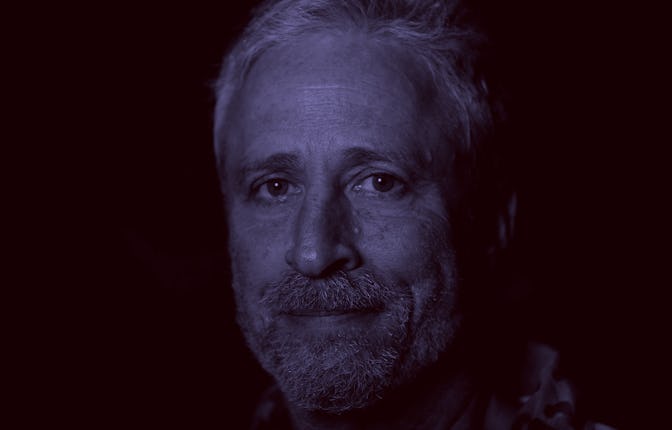The problem with 'The Problem With Jon Stewart'

When Jon Stewart debated the bowtied Tucker Carlson on CNN's Crossfire in 2006, he drew a now-infamous distinction between his work as a comedian and Carlson's career as a bigoted polemicist, explaining, "You're on CNN. The show that's leading into me is puppets making crank phone calls." It's a theme Stewart would return to during his tenure at The Daily Show, insisting to Fox News's Chris Wallace in 2011 that he wasn't solely a comic, but that "I'm a comedian first."
After stepping away from The Daily Show in 2015, Stewart is back on TV — well, the Apple+ subscription service, anyway — with a new show and a new shtick, albeit one that feels frustratingly similar to the role that made him a household name. In The Problem With Jon Stewart, Stewart has apparently embraced advocacy first, relegating the series's comedy to an awkward background role. It's a subtle but sufficiently jarring inversion that leaves the show in a strange, uncanny valley between the honed satire of The Daily Show in its prime, and the straight-ahead issue investigations of Frontline and other, more serious fare.
Unlike The Daily Show, inexorably caught in the tidal churn of the 24- hour news cycle, The Problem With Jon Stewart luxuriates in its ability to focus on a single topic. The premiere episode, which aired Thursday night, deals entirely with veteran health, and specifically illnesses caused by so-called "burn pits" from which soldiers inhaled fumes from human waste, leftover food, amputated limbs, and any other unwanted refuse. Stewart in particular seizes on the government's inability (and seeming unwillingness) to address the pandemic of seriously ill troops.
It's important to note that the topic is a deeply worthwhile one, and Stewart's concern comes across as utterly sincere. There's no question that Stewart — who previously served as a crucial advocate for the health needs of 9/11 first responders — is sincerely committed to helping veterans. The episode's middle third consists entirely of a roundtable discussion between Stewart and multiple vets and their family members about their illnesses, and the degree to which they say the Department of Veterans Affairs has largely left them to suffer. From there, Stewart sits down with Veterans Affairs Secretary Denis McDonough to grill the man responsible for administering care and treatment to former troops on why, exactly, he hasn't done that.
Watching him go head to head with McDonough, you can't help but think of Stewart's final Daily Show warning that "bullshit is everywhere" and "if you smell something, say something." It's a sentiment he himself revisited in a recent interview with The New York Times's David Itzkoff.
"I think the mistake is thinking that speech was me saying, 'And this is how we win.' That isn't," Stewart explained. "There's so many different ways to build positive culture."
If that's true, then it's somewhat baffling why Stewart would choose to go back to what is, at least superficially, largely same format he abandoned more than half a decade ago. For as much as the show takes pains to expressly point out that this is not The Daily Show, the comparisons that would naturally arise no matter what The Problem's format ended up being are exacerbated by just how similar Stewart's new venture is to his old one. Save for some set changes and a more relaxed dress code, The Problem's opening desk-based monologue could be transposed into a Daily Show episode with minimal disruption.
It raises a necessary question, then: Do we need this?
As a greying, unshaved Stewart jokes in the opening seconds of the first episode: "I've been away from television for some time, and before we get started, I really wanted to address the elephant in the room — this is what I look like now." The joke, one of multiple bits of self-referential metahumor over the course of the show, stands as a tacit acknowledgement that The Problem is, in many ways, a slightly older version of what came before. That's not a bad thing, per se, but it hardly stands as justification for why this, and why now.
The inversion from "comedy first, then issues" to "issues, with a spoonful of sugary laughs to help the medicine go down" too only serves to highlight just how weird the whole endeavor feels, particularly given the number of Daily Show offshoots that already occupy the same space, like John Oliver's Last Week Tonight and Samantha Bee's Full Frontal. It's not that The Problem is bad. Far from it: The issues are serious and are given appropriate consideration and humanity, plus the jokes are for the most part pretty funny. Nevertheless, the show reminds me a bit of the feeling I get when an old wrestler is brought out of retirement to fight a new class of grapplers. Sure they've got all the moves, the flair, and the goodwill built up from years as a star, but it quickly becomes clear that the game has moved past where it once was, and what was once considered ahead of the curve has since been lapped by the very zeitgeist it helped create.
I liked The Problem With Jon Stewart. I think there's potential for it to tighten what makes it work, while losing that which makes it drag. But I don't imagine I'll actually watch it beyond the errant clips that might make it onto my timeline. There are better issues shows out there, and there's better comedy. It's nice to have a familiar face on my TV, but in 2021, it's hardly necessary.